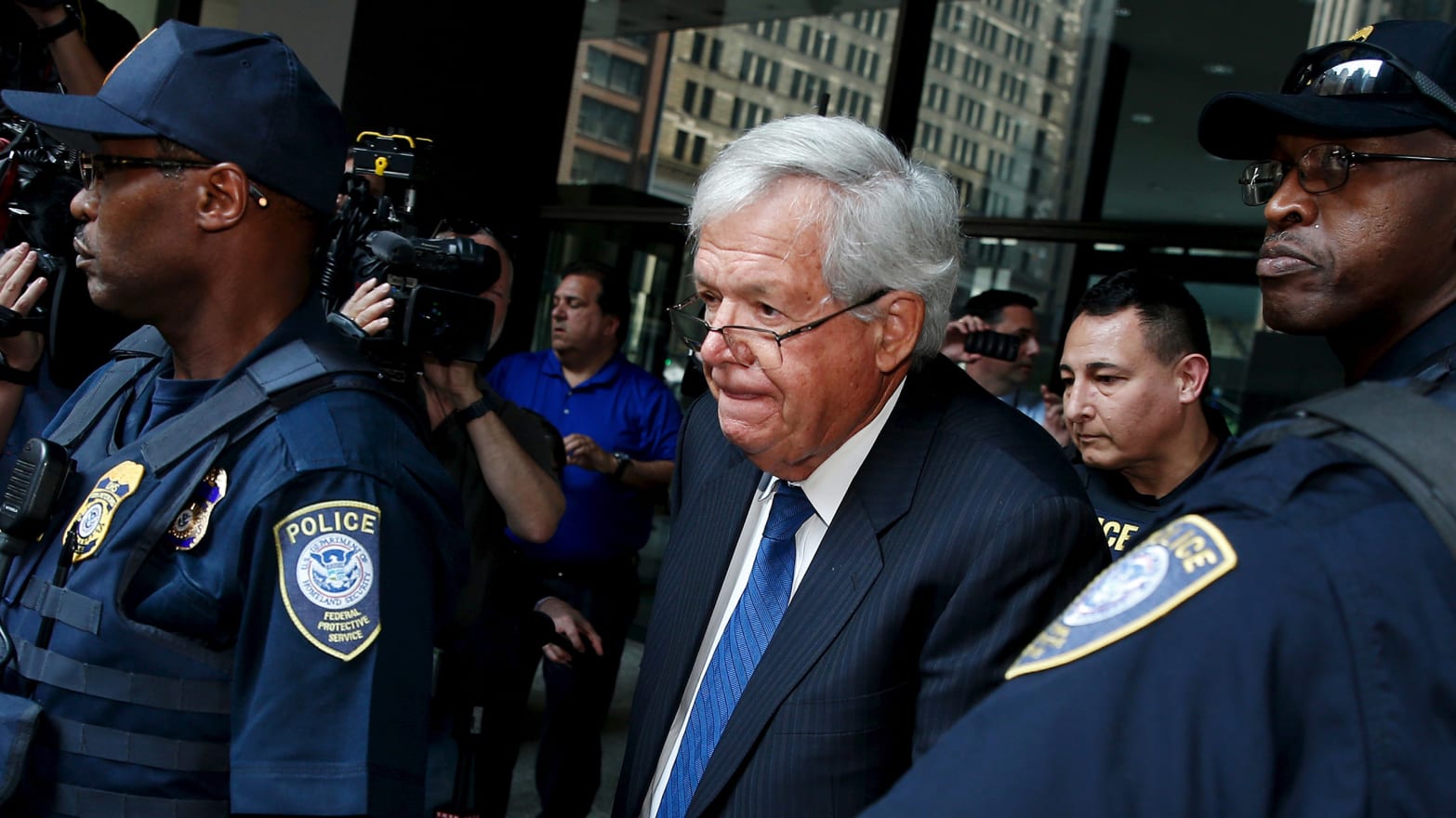Dennis Hastert, the former Speaker of the House whom everyone called “Coach,” pleaded guilty Wednesday to paying off a former student to cover up allegations of sexual abuse.
Hastert likely won’t go to prison—sentencing is set for Feb. 29—but he is the latest in a sorry line of famous men entrusted with the care of minors who instead sexually abused them: Jerry Sandusky, convicted of 45 counts of abusing teenage boys he met through “The Second Mile,” a nonprofit he founded to help underprivileged youth; and Jared Fogle, who traded child pornography with the co-director of his foundation, set up to raise awareness of childhood obesity, and who paid to have sex with teenage girls.
In theory, these falls from grace should affect not only Hastert, Sandusky, and Fogle, but also their parent organizations. Penn State, whose beloved football coach, Joe Paterno, ignored the rumors about his assistant. Subway, which hastily took down its ubiquitous photos of “Subway Guy” when Fogle’s case broke.
Not to mention the Republican Party, which brushed off years of rumors about Hastert but which has so far escaped the censure that has fallen on Penn State and Subway.
Surely these cases are every parent’s worst nightmare: the wrestling coach or the football coach, the politician or the priest, someone entrusted with the physical and emotional safety of children, turns out to exploit that trust for sexual gratification. And then he rises to a level of power and celebrity as to seem invincible, untouchable.
The reality is that such relationships, in which an older, powerful adult enjoys a position of authority relative to a younger, less-powerful teenager, are intrinsically risky. In addition to the power differential, relationships of mentoring and teaching necessarily involve some lowering of the usual emotional barriers. Ideally, they involve (appropriate, non-sexual) love.
It is also often the case—as in Hastert’s, Foley’s, Sandusky’s, and those of Catholic priests—that these intense emotional bonds are forged between older and younger men. In the overwhelming majority of cases, these bonds are healthy, wholly non-sexual, and part of growing up. And yet, perhaps in part because of the fear of even celibate male bonding, we’ve often seen gay people made into scapegoats, with gay men banned from serving as teachers, mentors, or scout leaders.
Of course, well-adjusted gay people don’t abuse kids. Closeted, warped, repressed people—gay and straight alike—do. Denny Hastert has more in common with Jared Fogle (whose targets were exclusively female) than with Anderson Cooper, or Bishop Gene Robinson, or me.
Unfortunately for homophobes, abusers like Hastert aren’t “other.” They aren’t boogeymen who can easily be identified, or spotted in leather at gay pride parades. (On the contrary, the leathermen are probably the least likely to abuse, precisely because they’re consciously, consensually and carefully exploring their sexuality.) They are, in fact, the coaches next door.
The appearance of respectability is, in fact, no guarantee of inner goodness. If recent experience is any guide, the opposite would seem to be the case: Josh Duggar, Bishop Eddie Long, Ted Haggard, George Rekers. It seems the more you preach against “unfettered” sexuality, especially homosexuality, the more likely you are to be engaging in it.
That’s why repressive, sex-shaming gatherings like this week’s World Congress of Families, and other conservative attempts to shame human beings into acting responsibly, are doomed to repeat the mistakes of the past. Conservative morality seeks to coerce goodness with threats of sin and punishment, and dire warnings of societal collapse. But it often doesn’t work.
It doesn’t work to regard all sexuality as sinful. It doesn’t work to empower the same structures of patriarchy and control that protect predators in the first place. And it especially doesn’t work when it targets the “other”—women who are slut-shamed and judged, gays who are lied about and demonized.
In fact, the closer one looks, the more Hastert’s scandal begins to resemble the Catholic Church’s sex scandals of the 1990s and 2000s, in which abusers covered for other abusers, and an entire hierarchy looked the other way. Remember, Hastert wasn’t just an abuser himself; he also covered up Congressman Mark Foley’s serial solicitation and abuse of underage male congressional pages, which took place on Hastert’s watch.
In fact, at least a dozen other congressmen, including John Boehner, knew of Foley’s salacious emails to underage boys years before they were made public. They conducted business as usual with Foley, all the while knowing that he had solicited teenagers for sex.
But hey, Hastert and Foley seemed like such stand-up guys. So did Jerry Sandusky. So did Jared Fogle. So, for that matter, did your local parish priest. And that is the problem: Respectability politics protects the guilty, and scapegoats the innocent. One wonder if just maybe, after enough of these cases of “respectable” men turning out to be sexual predators, we’ll stop giving so much respect to the respectable. Maybe we’ll look at data, rather than “common sense,” to assess risks, empower victims, and protect against abuse. Maybe we’ll create climates of safety for whistleblowers, instead of hierarchies resistant to exposing their own misconduct. Maybe Republicans will take Hastert’s portrait down from its prominent perch in the House.
Then again, maybe they should leave it up there as a reminder of what child molesters can look like.

